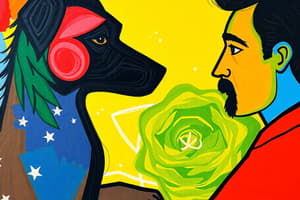Podcast
Questions and Answers
What is learning?
What is learning?
Any lasting change in behavior brought about by experience or practice.
Who is Ivan Pavlov?
Who is Ivan Pavlov?
A Russian scientist known for classical conditioning and his work on digestion in dogs.
What is classical conditioning?
What is classical conditioning?
Learning to make a reflex response to a stimulus other than the normally produced reflex.
What is an unconditioned stimulus (UCS)?
What is an unconditioned stimulus (UCS)?
What is an unconditioned response (UCR)?
What is an unconditioned response (UCR)?
What is a conditioned stimulus (CS)?
What is a conditioned stimulus (CS)?
What is a neutral stimulus (NS)?
What is a neutral stimulus (NS)?
What is a conditioned response (CR)?
What is a conditioned response (CR)?
What does acquisition refer to in classical conditioning?
What does acquisition refer to in classical conditioning?
What is extinction in classical conditioning?
What is extinction in classical conditioning?
What is stimulus generalization?
What is stimulus generalization?
What is stimulus discrimination?
What is stimulus discrimination?
What is spontaneous recovery?
What is spontaneous recovery?
What is a conditioned emotional response (CER)?
What is a conditioned emotional response (CER)?
What is vicarious conditioning?
What is vicarious conditioning?
What is conditioned taste aversion?
What is conditioned taste aversion?
What is biological preparedness?
What is biological preparedness?
What are stimulus substitutions?
What are stimulus substitutions?
What is the cognitive perspective in classical conditioning?
What is the cognitive perspective in classical conditioning?
Study Notes
Learning and Conditioning Concepts
- Learning refers to any lasting change in behavior resulting from experience or practice.
Ivan Pavlov
- A Russian physiologist known for his work in classical conditioning, particularly regarding digestion in dogs.
Classical Conditioning
- Involves basic survival responses; it is the process of associating a reflex response with a stimulus that isn't typically involved in the response (e.g., linking salivation from food to the sound of a tuning fork).
Unconditioned Stimulus (UCS)
- A naturally occurring stimulus that triggers an involuntary response, without needing prior learning.
Unconditioned Response (UCR)
- The automatic response elicited by an unconditioned stimulus.
Conditioned Stimulus (CS)
- A previously neutral stimulus that, after being paired with an unconditioned stimulus, can evoke a learned reflex response.
Neutral Stimulus (NS)
- A stimulus that initially does not evoke a response but can become a conditioned stimulus after conditioning.
Conditioned Response (CR)
- A learned reaction to a conditioned stimulus following the conditioning process.
Acquisition
- The process where repeated pairings of a neutral stimulus with an unconditioned stimulus lead to learning.
Extinction
- The reduction or disappearance of a learned response when the unconditioned stimulus is no longer presented.
Stimulus Generalization
- The tendency to respond to stimuli that are similar to the original conditioned stimulus with the conditioned response.
Stimulus Discrimination
- The learned ability to distinguish between similar stimuli, resulting in a lack of response to those that have not been paired with the unconditioned stimulus.
Spontaneous Recovery
- The return of a learned response after a period of extinction, indicating the persistence of learned behavior.
Conditioned Emotional Response (CER)
- An emotional reaction that has been classically conditioned, such as fear responses potentially leading to phobias.
Vicarious Conditioning
- The process where an individual learns a reflex response or emotion by observing another person's reactions.
Conditioned Taste Aversion
- The development of a negative reaction to a specific taste after it has been associated with illness or unpleasantness.
Biological Preparedness
- A concept suggesting that some animals are naturally inclined to form certain associations that enhance survival, such as taste and nausea.
Stimulus Substitutions
- Pavlov's original theory that classical conditioning occurs when a conditioned stimulus replaces the unconditioned stimulus in evoking a response.
Cognitive Perspective
- A modern take on classical conditioning that highlights the informational role of the conditioned stimulus in anticipating the unconditioned stimulus.
Before Conditioning
- Organic responses: Food (UCS) produces salivation (UCR); Tone (NS) elicits no salivation (no response).
During Conditioning (Acquisition)
- The pairing of the tone (CS) with food (UCS) leads to salivation (UCR).
After Conditioning
- The tone (CS) alone can elicit salivation (CR) without the presence of food.
Salivation as an Innate Reflex
- Salivation prior to conditioning is considered a natural, innate reflex response.
Studying That Suits You
Use AI to generate personalized quizzes and flashcards to suit your learning preferences.
Description
Explore the fundamentals of classical conditioning with this set of flashcards. Learn key concepts such as the definition of learning, and discover the contributions of Ivan Pavlov to this essential learning theory. Perfect for students and anyone interested in psychology.




